Cousins Refuse to Send Their Photos for Grandpa’s Gift, Get Replaced by the Family Dog
Family projects have a way of revealing who actually follows through and who just likes to weigh in. A simple group effort—like making a birthday gift for Grandpa—can turn into a quiet test of patience, planning, and how seriously everyone takes “just one small favor.”
In this case, one grandchild took the lead on creating something thoughtful: a custom phone case featuring all the cousins. They provided everyone with clear instructions, sent reminders, and even warned that anyone who failed to send their photo would lose their spot to the family dog. Still, some cousins didn’t bother.
It’s a small situation, but one many people recognize—when accountability meets apathy within families. The moment you try to organize something heartfelt, someone inevitably drops the ball, then gets upset when consequences follow. What starts as a funny “oops” moment can quickly turn into family drama about respect, effort, and fairness.
The story strikes that nerve between humor and obligation. Was it petty to make the swap, or fair to stand by the warning? Either way, it’s a reminder that even the kindest family gestures can turn into lessons in follow-through—and the dog sometimes ends up stealing the show.
Just take a look at this and see what people had to say...
A Sweet Idea Turns into a Group Project No One Asked For—but She Was Determined to Make It Happen.
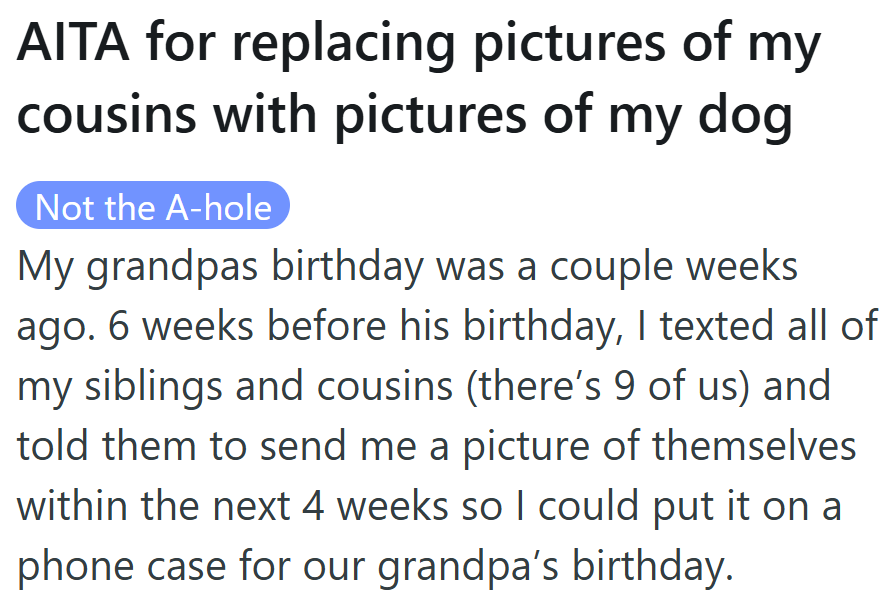
The Cousins Thought Their Instagram Pics Would Do. She Thought Her Dog Looked Better Anyway.
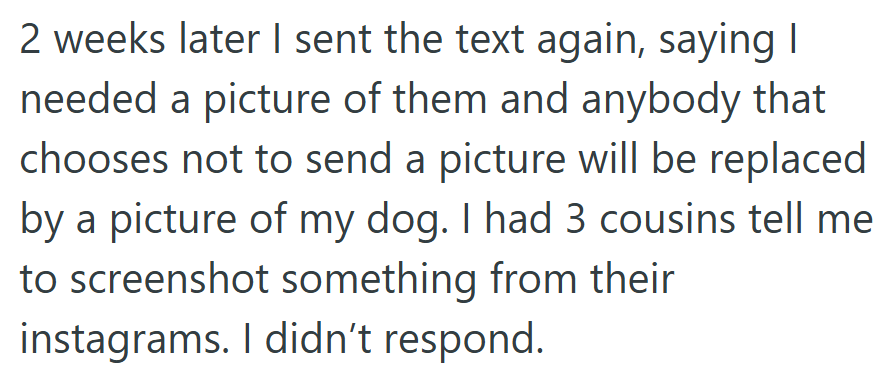
Twenty-Four Hours Left on the Clock—and the Dog Was Ready for His Close-Up.

The Importance of Family Communication
Effective communication is vital in family dynamics, as emphasized by Dr. William Doherty, a family therapist with decades of experience. He notes that when family members fail to communicate their intentions or commitments, misunderstandings can arise, leading to feelings of frustration and disappointment.
In this scenario, the grandchild who took initiative clearly expressed their desire for the project to succeed, while the lack of response from the cousins may suggest disengagement or lack of organization. Creating open lines of communication can prevent such issues in future family projects.
Building a culture of appreciation is essential for fostering positive family dynamics. Dr. Shawn Achor, a positive psychology researcher, emphasizes that expressing gratitude can significantly enhance relationships. In the scenario where the grandchild substituted their dog’s photos, acknowledging the effort put into the project, regardless of the outcomes, could lead to a more positive environment.
Encouraging family members to recognize each other's contributions can reinforce bonds and motivate participation in future collaborative efforts, making family projects more enjoyable for everyone.
No Cousin Photos? No Problem. Grandpa Got a Phone Case Full of Canine Cosplay.

They Had Three Chances, Fair Warning, and Still Acted Shocked When the Dog Made the Cut.
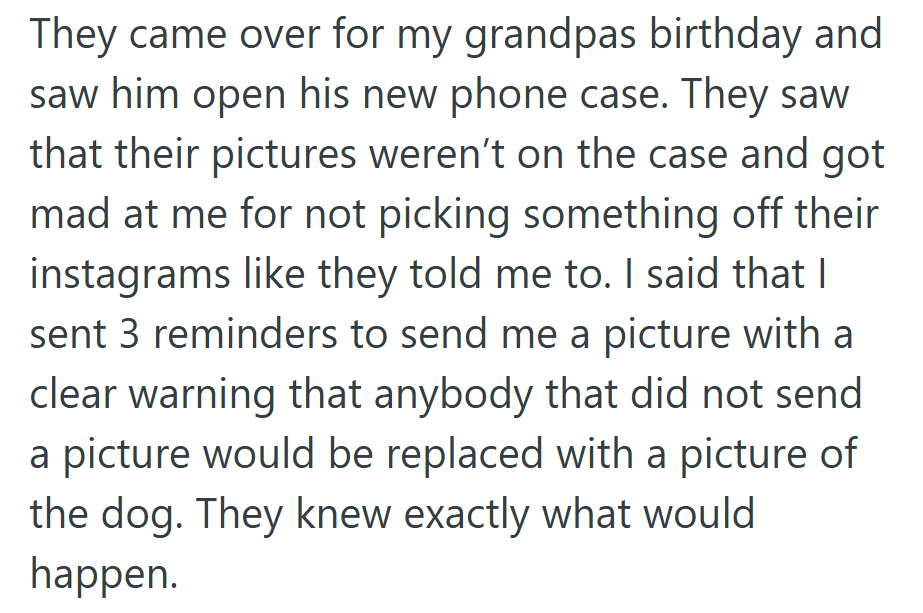
What Grandpa Saw as a Funny Gift, Some Relatives Saw as a Personal Slight.
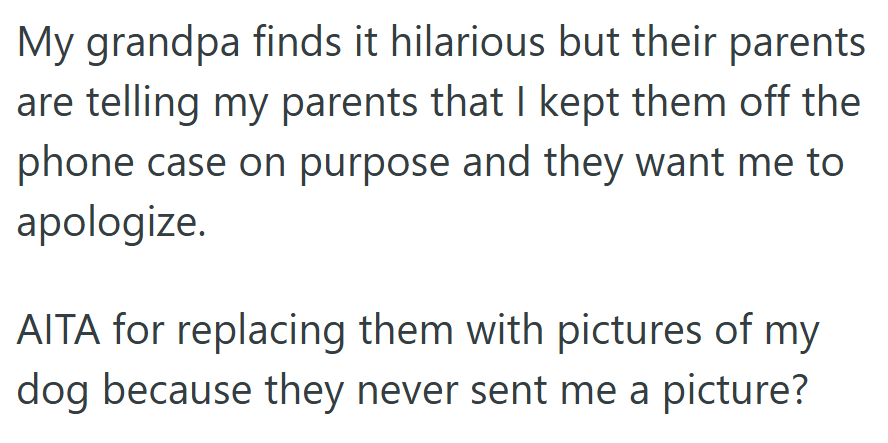
Psychologists emphasize the significance of shared responsibilities in family relationships. Dr. John Gray, a well-known relationship author, points out that when one person feels overburdened by family tasks, it can lead to resentment. To foster a sense of shared ownership, it’s essential to assign specific roles and deadlines for family projects.
Implementing a system where each family member is accountable for their contribution can enhance participation and ensure that everyone feels valued. This approach not only strengthens bonds but also teaches responsibility.
Hard to Argue with That Logic. If Grandpa’s Smiling, the Mission Was Accomplished.
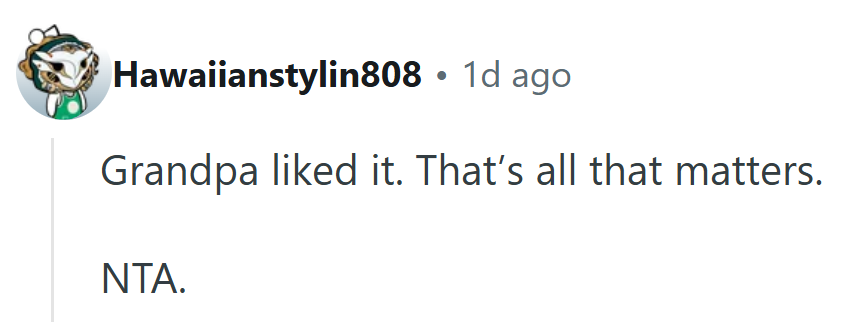
The Real Question Isn’t Who Got Replaced, but Who Actually Cared Enough to Chip In.

It’s Hard to Feel Bad for People Who Ignored Every Reminder and Then Got Upset About the Outcome.
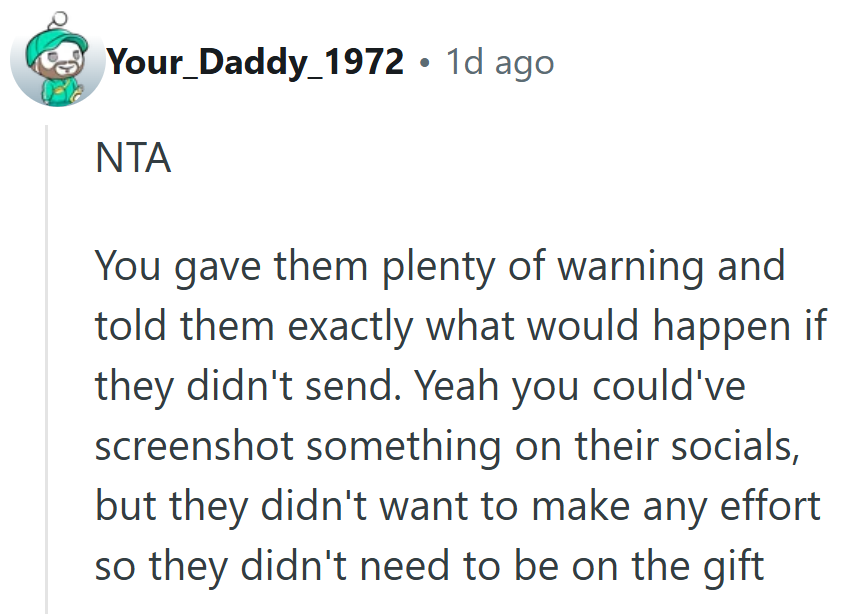
Understanding Family Dynamics
Family dynamics play a crucial role in how projects are approached and managed. Dr. Alexandra Solomon, a relationship therapist, highlights that different family members often have varied communication styles and levels of engagement. This variation can create tension, particularly in collaborative efforts.
In situations like the one described, it's important for families to establish a norm of participation and follow-through. Encouraging discussions about family roles and expectations can lead to healthier interactions and more successful collaborative outcomes in future projects.
Clear Communication, Fair Warning, and an Upgrade Courtesy of the Dog. Hard to Argue with That.
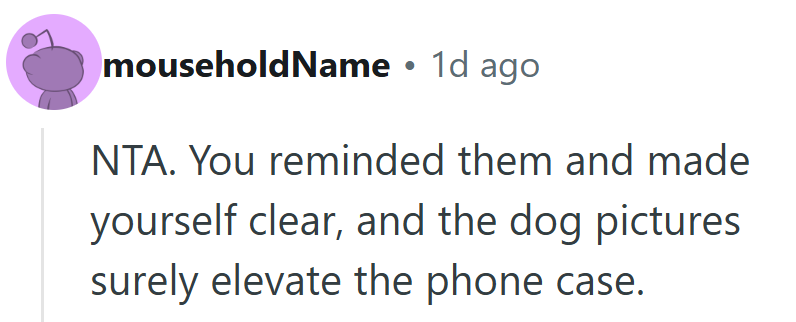
It’s a Sweet Reminder That a Personal Gift Doesn’t Need to Please the Whole Family to Mean Something.
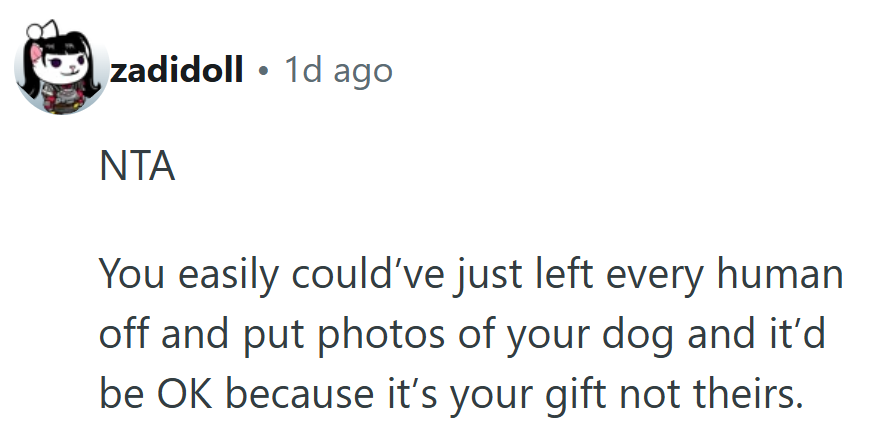
Let’s Be Real, the Only “Lazy” Move Here Was Not Sending a Photo Before the Dog Stole the Spotlight.
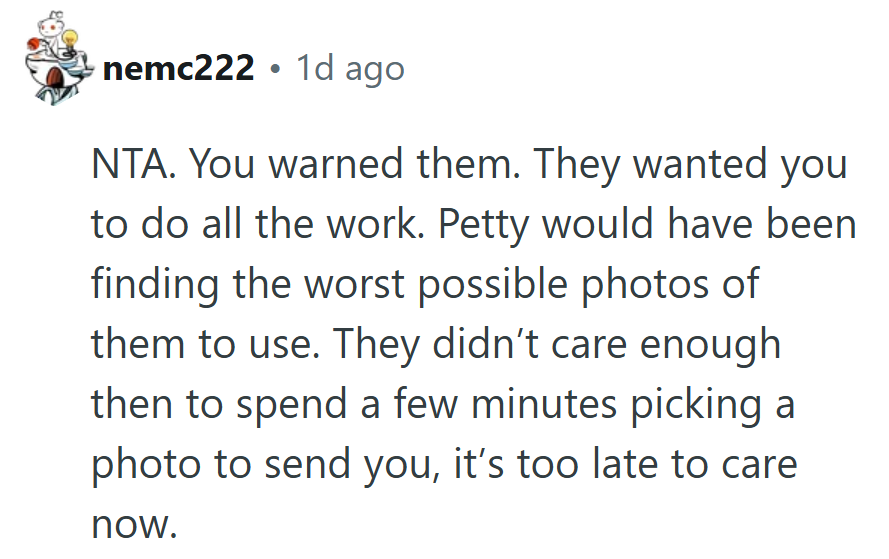
A relationship expert suggests that the feelings of frustration experienced by the proactive grandchild could be addressed through constructive feedback. Dr. Pat Love emphasizes the importance of expressing feelings without blame. Instead of focusing on the lack of response from cousins, it would be helpful to communicate how their absence affected the project and the emotional investment made.
Doing this fosters understanding and can encourage more active participation in future family initiatives, making everyone feel more inclined to contribute.
It Might Be Harshly Worded, but the Heart of It Stands: Grandpa’s Joy Outweighs Their Offense.
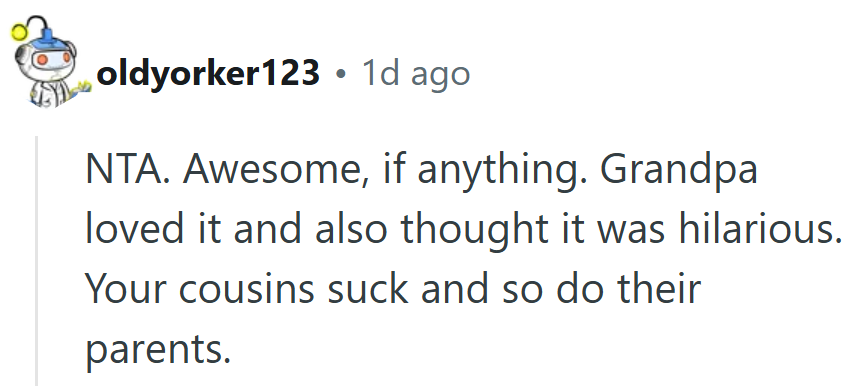
Every Family Has That One “Team Project” Where Only One Person Actually Does the Work.
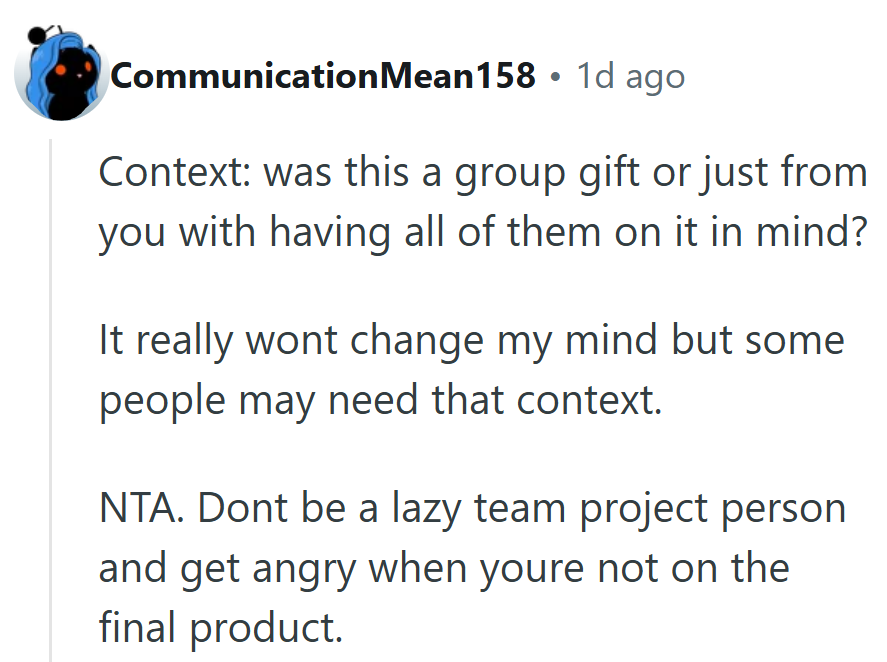
Receipts Don’t Lie—Three Warnings and a Clear Consequence Make This an Open-and-Shut Case.
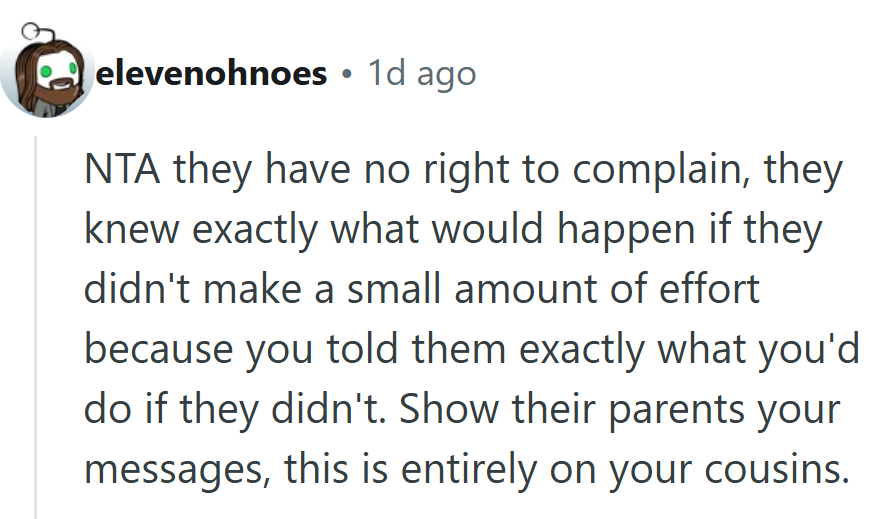
Navigating Family Obligations
Family obligations can sometimes lead to stress, especially when expectations are unclear. Dr. Kristin Neff, a researcher in self-compassion, suggests that individuals often need to balance personal needs with familial expectations. In the case of the cousins, their lack of response might stem from feeling overwhelmed or not understanding the urgency of the request.
Encouraging family members to practice self-compassion can help them communicate their limitations honestly, leading to healthier interactions and reducing the likelihood of misunderstandings in future family projects.
Participation Required, Excuses Not Accepted.
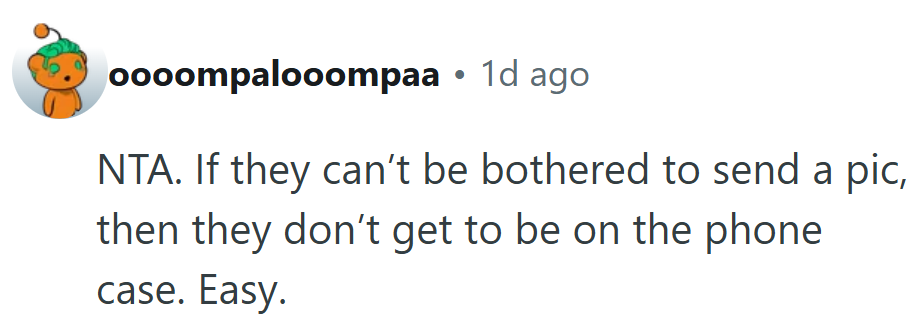
“Fluff Around and Fluff Out” Might Be the Perfect Motto for This Entire Family Saga.
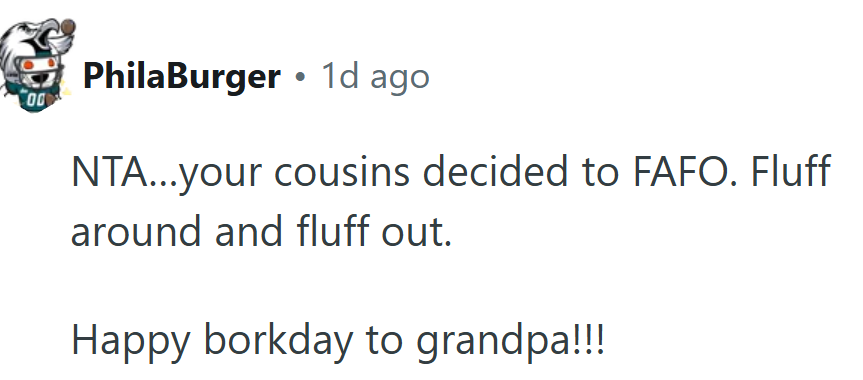
At This Point, the Dog’s Modeling Portfolio Might Genuinely Outshine the Cousins’.

To improve future family interactions, experts advise establishing a collaborative environment where everyone feels empowered to contribute. Dr. Alfie Kohn, an education expert, suggests incorporating elements of choice and autonomy in family projects as a way to boost engagement. When family members feel they have a say in how tasks are assigned, they are more likely to participate actively.
Setting clear expectations and allowing for individual preferences can enhance motivation and cooperation, making family projects more enjoyable and successful.
They Ignored the Deadline, the Dog Got the Spotlight, and Now Grandpa’s Case Is Legendary.

It’s the Classic Case of Effort Misplaced—they Could’ve Solved It in Seconds.

Grandpa Got a Laugh, the Cousins Got a Lesson, and the Dog Got His Modeling Debut.
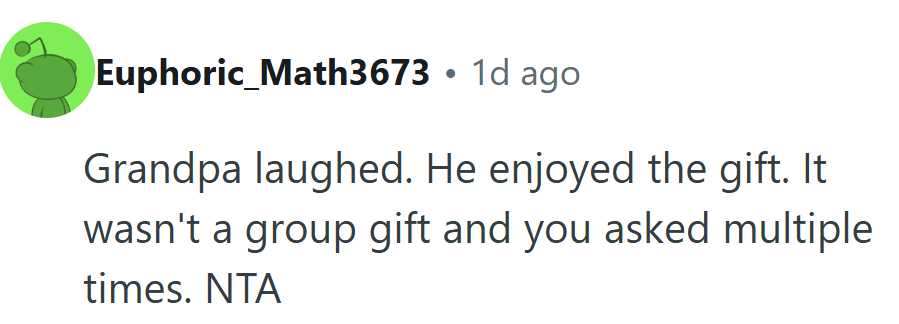
The Role of Accountability
Accountability is a key component of effective teamwork, especially in family settings. Dr. Daniel Kahneman, a behavioral economist, notes that when individuals feel responsible for their contributions, they are more likely to follow through. This principle applies well in family projects, where shared accountability can lead to better outcomes.
In this case, assigning specific tasks to each cousin with deadlines may have spurred them into action, ensuring that everyone feels included and valued. Such measures can transform family gatherings into more collaborative and fulfilling experiences.
For some, the decision was harmless fun and a well-earned laugh. For others, it crossed into unnecessary embarrassment that could’ve been avoided with a little flexibility. But that’s the tricky balance with family—where boundaries, humor, and tradition often collide.
At what point does “just a joke” become a statement about who shows up and who doesn’t? Would you have swapped the cousins out—or gone digging through their Instagram instead? Share this story with the relative who always needs a reminder before the group gift deadline!
Expert Opinion
This situation really highlights how family dynamics can stir up feelings of obligation and accountability. When some cousins dropped the ball despite clear communication, it likely sparked a mix of resentment and embarrassment, reflecting the tension between individual motivations and group expectations. It’s a classic case of how even lighthearted family projects can expose deeper issues of commitment and fairness, reminding us that participation isn’t just about completing a task—it’s about valuing the relationships behind it.Understanding the dynamics of family projects offers valuable insights into enhancing communication and participation. Both psychologists and relationship experts stress the importance of establishing clear roles and expectations to prevent misunderstandings and frustration. Encouraging open lines of communication, fostering accountability, and cultivating an environment of appreciation can significantly improve family interactions.
Ultimately, by applying these strategies, families can transform collaborative projects into opportunities for bonding, growth, and shared experiences, ensuring that everyone feels valued and engaged in future endeavors.



